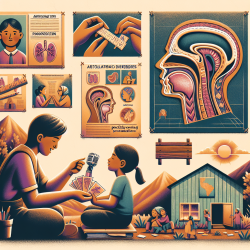Introduction
In the realm of speech-language pathology and online therapy, data-driven decisions are paramount to achieving optimal outcomes for children. As professionals, we constantly seek evidence-based strategies to enhance our practice and improve the lives of those we serve. A recent study titled "Can Support Groups Improve Treatment Adherence and Reduce Sexual Risk Behavior among Young People Living with HIV? Results from a Cohort Study in South Africa" provides valuable insights that can be applied to our field.
The Power of Support Groups
The study conducted in South Africa focused on adolescents and young adults living with HIV (AYLHIV), a demographic that faces unique challenges in treatment adherence and sexual health. The intervention involved a structured 14-session support group aimed at improving treatment adherence and reducing sexual risk behaviors. The results were promising, with participants significantly more likely to report at least 95% adherence to antiretroviral therapy (ART) and improved self-rated health.
Key Findings and Their Implications
The study revealed several key findings that can inform our practice:
- Improved Treatment Adherence: Participants in the support group were more likely to adhere to their ART regimen, a critical factor in achieving viral suppression and improving health outcomes.
- Enhanced Health Perception: Participants reported better overall health, which is indicative of the positive impact of psychosocial support and education on their well-being.
- Increased Contraceptive Use: Among sexually active participants, there was a significant increase in contraceptive use, highlighting the importance of integrating sexual and reproductive health education into interventions.
Applying These Insights to Speech-Language Pathology
While the study focused on HIV treatment adherence, the principles of support groups can be applied to speech-language pathology and online therapy. Here are some ways practitioners can implement these insights:
- Facilitate Peer Support: Create opportunities for children to engage in peer support groups where they can share experiences, challenges, and successes. This can foster a sense of community and motivation to adhere to therapy goals.
- Integrate Holistic Education: Incorporate education on health and wellness into therapy sessions. This can include topics such as nutrition, exercise, and mental health, which are crucial for overall well-being.
- Encourage Family Involvement: Involve families in the therapy process to provide additional support and reinforcement of therapy goals at home.
Encouraging Further Research
While the study provides valuable insights, it also highlights the need for further research in this area. Practitioners are encouraged to explore the potential of support groups in different contexts and for various conditions. By conducting research and sharing findings, we can collectively enhance our understanding and improve outcomes for children.
To read the original research paper, please follow this link: Can Support Groups Improve Treatment Adherence and Reduce Sexual Risk Behavior among Young People Living with HIV? Results from a Cohort Study in South Africa.










